Across That Bridge: Life Lessons and a Vision for Change
January 6, 2014 Leave a commentThe most inspiring book I read in 2013 was Across that Bridge: Life Lessons and A Vision for Change, by Congressman and Civil Rights legend, John Lewis. He built the book around several practices that are essential for social justice work: faith, patience, study, truth, peace, love and reconciliation.
He bears witness to the ways in which these practices came together in the Civil Rights Movement, and particularly in the Student Nonviolent Coordinating Committee, to create a context where the movement was modeling the kind of world it was striving to create. He writes, “Why do we struggle? Why must we, as members of the human family, immerse ourselves in the agency of turmoil and unrest to affect the evolution of humankind? Why participate in the work of justice at all? Why risk beating, torture, even death to sacrifice ourselves within the network of our family, on our jobs, in our communities, the nation, or the world at large for the sake of progress we may not live to see? Why must we be the ones? Each of us must answer those questions according to the dictates of our conscience and the principles of our faith. I believe that we are all a spark of the divine, and if that spark is nurtured it can become a burning flame, an eternal force of light. I believe the true destiny of humankind is to recollect that it is light and to learn how to abide in infinite awareness of the divine in all matters of human affairs…
“Love is the willingness to sacrifice, to be beaten, to go to jail, to be killed for the betterment of society rather than live out your life in silence. The Civil Rights Movement, above all, was a work of love. Yet, even fifty years later, it is rare to find anyone who would use the word love to describe what we did. We were consciously aware that unity was our ultimate goal, and if that was truly our aim, we had come to grips with the fact that after all the warring was done, reconciliation, love, and forgiveness would have the final say.”
I hope that these words of Congressman Lewis, plus the introductory quotes for each chapter will whet your appetite for the whole book.
Introduction: “Some men see things as they are and say ‘Why?’ I dream things that never were and say ‘Why not?’” —Robert F. Kennedy
Faith: “Faith is the substance of things hoped for, the evidence of things not seen.” Hebrews 11: 1
Patience: “Without patience, we will learn less in life. We will see less. We will feel less. We will hear less. Ironically, rush and more usually mean less.” — Mother Theresa
Study: “Our deepest fear is not that we are inadequate. Our deepest fear is that we are powerful beyond measure. It is our light, not our darkness that most frightens us. We ask ourselves, ‘Who am I to be brilliant, gorgeous, talented and fabulous?’ Actually, who are you not to be? You are a child of God. Your playing small doesn’t serve the world. There is nothing enlightened about shrinking so that other people won’t feel insecure around you. We were born to make manifest the glory of God that is within us. It is not just in some of us; it’s in everyone. And when we let our own light shine, we unconsciously give other people permission to do the same. As we are liberated from our own fear, our presence automatically liberates others.” —Marianne Williamson
Truth: “The truth is incontrovertible. Malice may attack it, ignorance may deride it, but in the end, there it is.” —Winston Churchill
Peace: “Peace is softening what is rigid in our hearts. We can talk about ending war and we can march for ending war, we can do everything in our power, but war is never going to end as long as our hearts are hardened against each other.” —Pema Chödrön
Love: “We are all bound by the ties of love… Even as there is cohesive force in blind matter so much must there be in all things animate and the name for that cohesive force among animate beings is Love.” — Mohandas Gandhi
Reconciliation: “This little light of mine, I’m going to let it shine.” — Harry Dixon Loes
